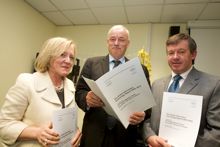2010 Press Releases
30.03.2010
The importance of the Information and Communications Technology (ICT) sector and the €75 billion exports generated by this industry has been highlighted in a recently-published Report.
The Report, The Global Information Technology Report 2009-2010, launched by UCC’s College of Business & Law is an Internationally recognised publication and is a joint effort between the World Economic Forum and INSEAD.
Following on from The Government Report, Technology Actions to Support the Smart Economy (2009), Ireland was selected as a country case study. The study, ICT Supporting the Smart Economy: The Case of Ireland is published as a chapter of the Report by Professor Barry McSweeney, Adjunct Professor at UCC’s College of Business & Law. Professor McSweeney was also the lead author of the earlier Technology Actions report. He is currently the Director of the National Knowledge Society Strategy at the Department of Communications, Energy and Natural Resources.
The case-study presents the development of ICT in Ireland in the context of the country’s industrial and economic development context. It underlines the importance of the 87,000 currently employed in the ICT sector and traces much of this success in the past to high level of process engineering skills and underlines the high level of product/process optimisation.
The study maintains that Irish expertise in ICT can be harnessed in a number of innovative ways focusing on a low-carbon economy approach. This knowledge intense approach will be necessary to maintain and further develop Ireland’s lead position in ICT. The potential of interaction of ICT and energy is highlighted and the case for developing a number of areas where Ireland is seen as a leader is advocated. Six action areas are chosen which could create 30,000 new jobs over the next 10 years. A key action involves the establishment of an Exemplar test-bed in advanced communications . This is a partnership between the Government and Intune Networks (Irish indigenous company) supported by the research community, notably the Tyndall Institute at UCC.
The development of energy efficient data and cloud computing centres is seen as a very exciting opportunity; EMC is one of the leading companies working with the Government in this initiative.
The interaction of ICT in the development of smart electricity grids and networks is highlighted and the dynamic role of the ESB in this area is highlighted.
Other actions include advanced use of communication systems (the ‘internet of things’) to develop innovative goods and services. These include on-line remote environmental sensing (Smart Bay) and a combined intelligent traffic/work commuting approach.
The final action highlighted in the report relates to the development of an international content services centre based on the IFSC model.
The WEF competitiveness network draws up the data on individual countries and rankings and works together with its national partners. The Competitiveness Survey Group in the Department of Economics at UCC (Eleanor Doyle, Niall O’Sullivan and Bernadette Power) and the National Competitiveness Council are the Irish partner organisations.
Picture L-R: Professor Irene Lynch Fannon, Head, College of Business and Law, Professor Barry McSweeney, Adjunct Professor, College of Business and Law, Dr. Michael Murphy, President, UCC.
1379MMcS

